Reeves is at the podiumpublished at 12:04 BST 9 October 2023
The shadow chancellor has begun her speech. Stay with us for live updates.
Sir Keir Starmer promises a "decade of national renewal" in a speech to Labour’s annual conference in Liverpool
A 28-year-old man has been arrested after a protester burst on stage at the start of the speech and threw glitter on the Labour leader
Starmer vows to build "the next generation of new towns" and a total of 1.5 million new homes - in what could be his last party conference speech before the next election
Promising NHS reform, more police officers on the streets and 1.5 million new homes, he says: "Together we will fix tomorrow's challenges today"
Addressing the mass attacks in Israel, he says he "utterly condemns" the murder of men, women and children "killed in cold blood by the terrorists of Hamas"
You can watch the speeches by clicking play at the top of this page
Edited by Francesca Gillett and Nathan Williams
The shadow chancellor has begun her speech. Stay with us for live updates.
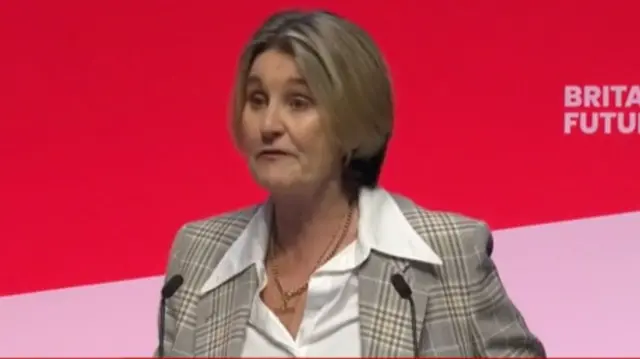
Over to Liverpool now. Up on stage currently is Mary Portas, a British retail consultant and broadcaster, is introducing Rachel Reeves to the conference. Portas previously advised David Cameron when he was prime minister.
She begins by highlighting the fact - if Labour is elected into government - Reeves will be Britain's first female chancellor. Delegates, and Portas herself, applaud this.
Stay with us for live updates of the shadow chancellor's speech. You can also watch it for yourself by clicking Play at the top of this page.
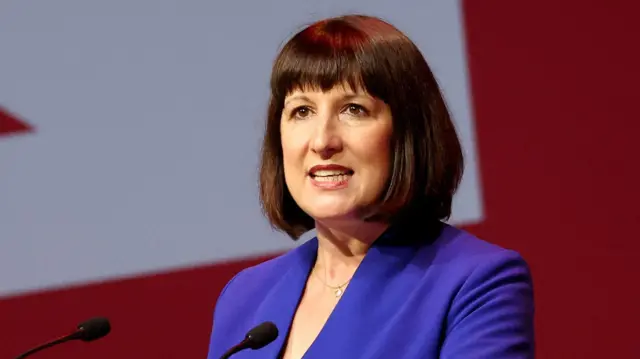 Image source, Reuters
Image source, ReutersShadow chancellor Rachel Reeves is due to speak at the Labour Party conference in about five minutes. The party has already briefed out some key announcements on its plans for if it wins power - here’s what we already know about what she’s expected to say:
You can watch live coverage from the conference - including Reeves's speech - by clicking the play button at the top of this page.

 Iain Watson
Iain Watson
Political correspondent, reporting from Liverpool
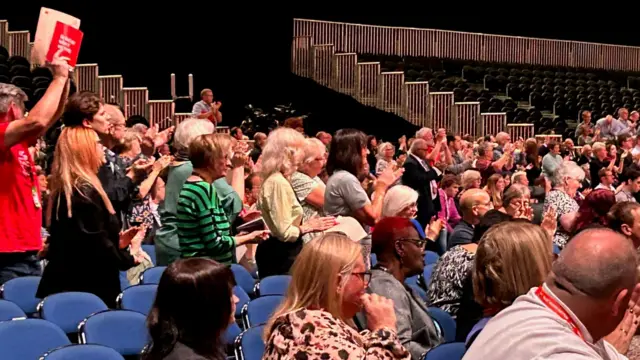
At this Labour conference, dissent has largely been confined to the fringe.
But the leader of the party’s largest trade union funder went for a full-frontal attack.
Unite’s Sharon Graham got a standing ovation from the conference floor for calling for renationalisation of the energy companies.
For good measure, the motion she was proposing also called for a Labour government to recommit to the cancelled section of HS2.
Most constituency delegates here are now pro-leadership.
Yesterday, they voted to keep most of the Left’s causes celebres off the agenda for debate.
But the unions get around half the votes at conference, so where they disagree with party leader Keir Starmer they can at least get their voices heard.
That said, the shadow cabinet weren’t listening.
And even if the nationalisation motion passes, the party leadership will almost certainly keep the commitment out of the next manifesto.
But it is a sign that a section of the party believes the leadership is being too cautious and not distinctive enough from the Conservatives.
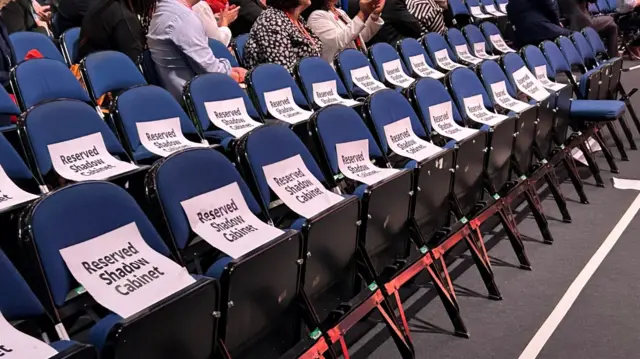
Seats reserved for the shadow cabinet were empty as Sharon Graham spoke to the conference
This could be the last conference season before the next election.
UK general elections - where all 650 MPs are elected to the House of Commons - have to be held no more than five years apart.
This means the next election is due by January 2025.
This represents five years from the day the current Parliament first met (17 December 2019), plus the time required to run an election campaign.
But the prime minister has the power to call an early poll at any time of their choosing, within the five-year period. Some pundits say the PM is likely to hold the vote in autumn 2024.
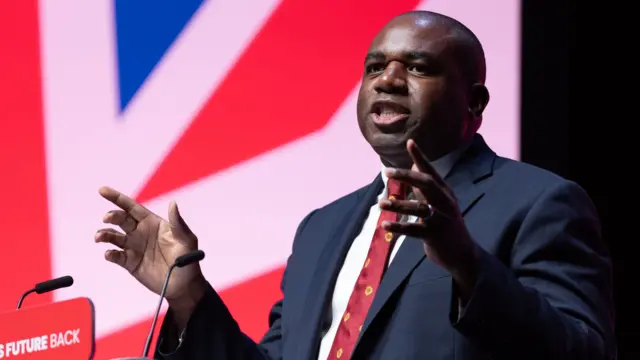 Image source, EPA
Image source, EPAShadow foreign secretary David Lammy has condemned the attacks by Hamas
Labour’s shadow cabinet has been largely united in its response to the attacks on Israel, with senior figures saying the country has a right to self-defence against terrorism.
Yesterday, leader Keir Starmer said there was “no justification” for the assault by Hamas over the weekend, while shadow foreign secretary David Lammy said his party “stands with the people of Israel”.
Lammy added that any response to the attacks should be “proportionate” and “within international law”, as he reiterated that Labour’s official position is to support a two-state solution, respecting "sovereignty of Israel and the dignity and human rights of Palestinians”.
However, Starmer’s predecessor as leader, Jeremy Corbyn, refused to directly condemn Hamas when questioned by journalists.
He stressed he does not “support any attacks” but said he wanted "peace, a ceasefire and a process that ends the Israeli occupation of Palestine".
The former leader is sitting as an independent MP after being removed from Labour's parliamentary party over his response to a report on antisemitism under his leadership. He remains a party member.
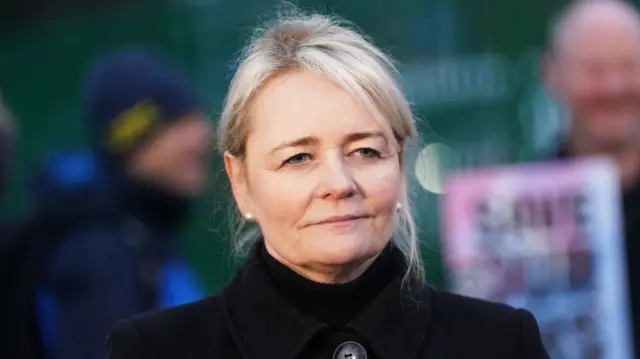 Image source, PA Media
Image source, PA MediaUnite leader Sharon Graham has called for Labour to be bolder
This afternoon, the Labour leadership is set for a showdown with Unite - historically the party’s biggest financial backer - over the union’s call to nationalise critical infrastructure, starting with the National Grid's electricity and gas networks.
Delegates will vote on whether the party should adopt the policy, which is opposed by shadow chancellor Rachel Reeves and Labour's leader Keir Starmer.
The union will move a motion calling for UK energy to be brought back into public ownership, as well as for a publicly owned railway and the delivery of the HS2 high speed train line in full.
Nationalising the railways is already Labour policy but last week Starmer said he couldn't commit to going ahead with HS2's northern leg after the announcement by Prime Minister Rishi Sunak that it would be scrapped.
Even if the motion passes, the party leadership could still ignore it when formulating their policy for the next general election.

 Nick Eardley
Nick Eardley
Political correspondent, reporting from Liverpool
Last week, the Conservative conference was an attempt to seize the political agenda. There were some attention-grabbing policies designed to show Rishi Sunak had new ideas.
This week, the Labour conference has a different aim.
Yes, there are important policy pledges. We’ll see a few of them spread over the week.
But just as important is not rocking the boat. Labour wants to reassure voters its political pitch is routed in the centre of British politics.
When you speak to shadow cabinet ministers, they talk of avoiding mistakes this week. Not making any audacious pledges that could spook voters.
You can understand why - Labour are ahead in the polls and many in the party think they’re on course for government.
But some members here - and some influential union leaders - want a bolder offer from the leadership.
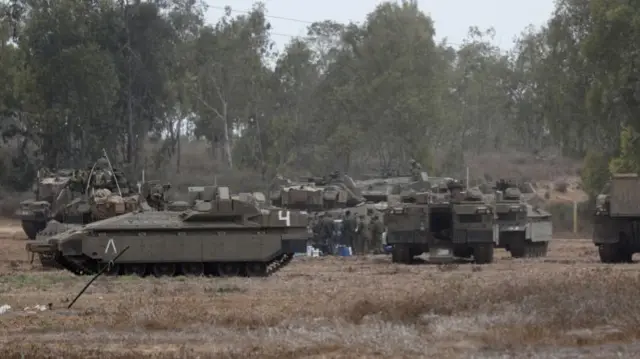 Image source, EPA
Image source, EPAAnother issue that came up in Reeves’s interviews this morning was the situation in Israel and Gaza.
The shadow chancellor condemned “terrorist attacks by Hamas”, which she said had “set back the cause of peace”.
Reeves said she had "no time" for people cheering for the Palestinian cause on the fringes of Labour’s conference.
She said Israel had "every right to defend itself" after Hamas's deadly surprise assault.
Asked about suggestions by some outside the conference that the cause was "the occupation of what they call Palestine”, the shadow chancellor told the BBC: "Gaza is not occupied by Israel."
"The real cause of what is happening now is a terrorist attack.”
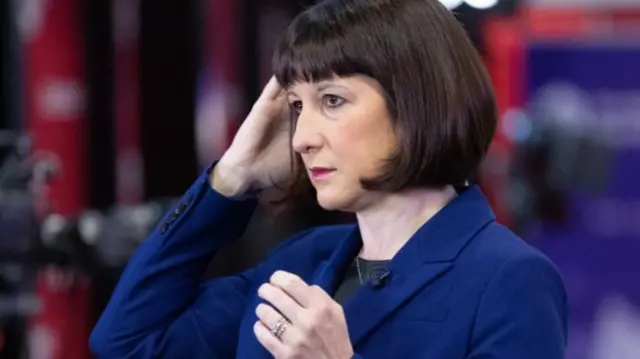 Image source, EPA
Image source, EPAAhead of her conference speech at 12 noon, shadow chancellor Rachel Reeves has been doing a whistle-stop tour of the media.
A big theme was Labour’s promise to spur economic growth by making it easier to build critical infrastructure for energy, transport and technology - including a pledge to fast-track the planning process for priority growth areas.
But critics have accused Labour under its leader Sir Keir Starmer of being too timid. BBC presenter Nick Robinson asked Reeves this morning: is Labour being bold enough?
"I'm under no illusions about the scale of the task that I will face if I become chancellor of the exchequer next year,” Reeves said.
"The public finances are in a dire state, growth is on the floor, public services are on their knees.
"It is going to require discipline, determination and hard choices. But they will be Labour choices based on our values."
Heather Sharp
Live reporter
Good morning. Thanks for joining our coverage of day two of the Labour Party conference in Liverpool.
In about an hour, shadow chancellor Rachel Reeves will take to the podium to outline the party's plans to bring about economic growth, if it gets into power in the general election expected near year.
We know she will stress plans to speed up infrastructure projects by overhauling planning rules - especially for green energy and 5G projects.
But the Labour leadership is also set for a showdown with the Unite union - historically the party's biggest financial backer - which says the party is being too "timid" and should include nationalising energy companies in its plans.
We have correspondents in Liverpool, as well as Joshua Nevett and Becky Morton from our Politics team with me here in London to bring you all the action.